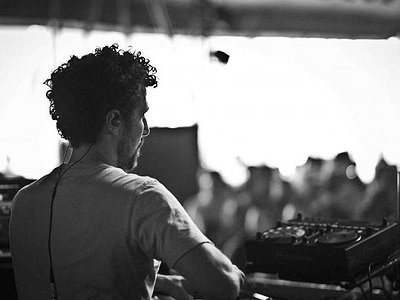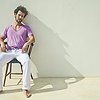When did you start DJing - and what or who were your early passions and influences?
Meeting someone who was a radio station DJ and hanging out on his show was the start of it all. He also owned a mobile DJ company, which I worked for, as an apprentice. This started everything for me. I was 13 and eager to learn, observe and absorb everything.
What do you personally consider to be the incisive moments in your artistic career?
Meeting the person described above. If I didn’t meet him, I wouldn’t be doing this interview with you now. Biggest moment. Hearing acid house music from Chicago in 1986. Meeting King Britt in 1988 when production & friendship started.
How would you describe your development as a DJ and what are currently your main challenges? What is it about DJing, compared to, say, producing your own music, that makes it interesting for you?
Staying true to my musical tastes is most important to me. When I’m DJing, it's understanding my role to balance ‘educating’ a crowd and ‘entertaining’ an audience.
DJing and producing creates a congenial balance for me. And I need both for this stability to work - it’s very important. That symmetry is what makes the process interesting.
What was your first set-up as DJ like? How has your set-up evolved over the years and what are currently your most important pieces of gear, both hardware and software?
I started when I was a teenager, using two technique SLB 10 belt driven turntables and a two channel mixer. And wow, how have things changed. I like to try and test new technologies out and if they work for me, I integrate them into my present set up. I don’t feel the need to always have the newest or most up to date toys out there, as I am a firm believer in being able to utilise what you have to the maximum before the onset of cutting edge gear. I like to master my set up. This way my gear becomes very important to me, where I control it, rather than it controlling me. But, as stated, I like the integration of the new and old.
What do you usually start with when preparing for a set?
For a DJ set I really need to get the feeling and vibe of the crowd. This helps clear my mind and get focused on the moment. I don’t really prepare for shows, I love the spontaneous flow of creative ideas and energy as I do my thang.
How important is building a real relationship with the music you're playing for your own approach? In how far, with regards to the overwhelming quantity of music available, is it actually still possible to build meaningful long-term relationships with a particular track or album at all? What, other than subjectivity, are your criteria for selecting what to play at a gig?
Good question. Before the onslaught of music that has been released over the years, I used to know everything about a track I would play. The physical relationship I had with my medium (vinyl) was intense. I would know records in and out. Now with so much music, I find it hard to have this intimate association with the tracks. I keep on putting music in my computer for performances, yet, rarely 'take music out' like I used to with a record case. So, I end up playing tracks at gigs that I've never have played before, and sometimes it’s an amazing feat and sometimes the outcome is quite dire.
When there's more music than one can possibly take in, it is becoming increasingly hard to know what constitutes an original and a remake anymore. What's your opinion on the importance of roots, traditions, respecting originals and sources?
For me it’s nice to have knowledge, as I believe that with knowledge comes empowerment, and I like to learn, and be educated. But, hey, that’s just me. There are lots of people who are extremely talented without knowing the history or origin of certain things. And this can be applied in any field, not just with music.
One of the particularities of DJing is that takes people outside their own little box for a few hours, without the option of switching channels, changing the song according to their own taste or remaining within their virtual circle. How do you, as a DJ, make use of this freedom? How important are not just the entertainment- but also the curatorial functions of DJs today - compared to other media like radio or print- and online-journalism?
From my background as a mobile DJ to becoming an artist and producer, I have seen and feel that a DJ has an obligation to do a few things: 1) entertain 2) educate and 3) create an atmosphere.
These are very important things for me. However, I love the ability to help people get lost for a couple hours, like a sort of aural zoning, where an individual might have important matters on their mind and can make them vanish by closing their eyes and disappearing into the NOW through the power of music and stimulation. I love it! I can get on the dance floor, right in the speaker bin, close my eyes and get immersed, thinking about nothing but what’s happening right then and there.
Thanks to developments in the realm of software, DJing, playing live and producing have moved closer together than ever before, allowing DJs to change a track down the tiniest detail. In which way are you making use of these possibilities in your sets and in which way, do you feel, does the music benefit from them? Do you feel a crowd is actually able to appreciate the intricacies of complex DJing, if they don't actually know what, precisely, is happening behind the decks?
I like all these creative possibilities that are developing and the tools that can be used by an artist to go as far as they willing want to. I love it. I try to embrace technology and use it where it’s not over powering, so it's a situation that I can really control rather than it controlling me.
I enjoy pushing my boundaries, yet I don’t want to lose the connection with the audience by staring into screens, mixers or gadgets. I don’t want to be the DJ that looks like he’s checking emails or searching for vintage gear online.



